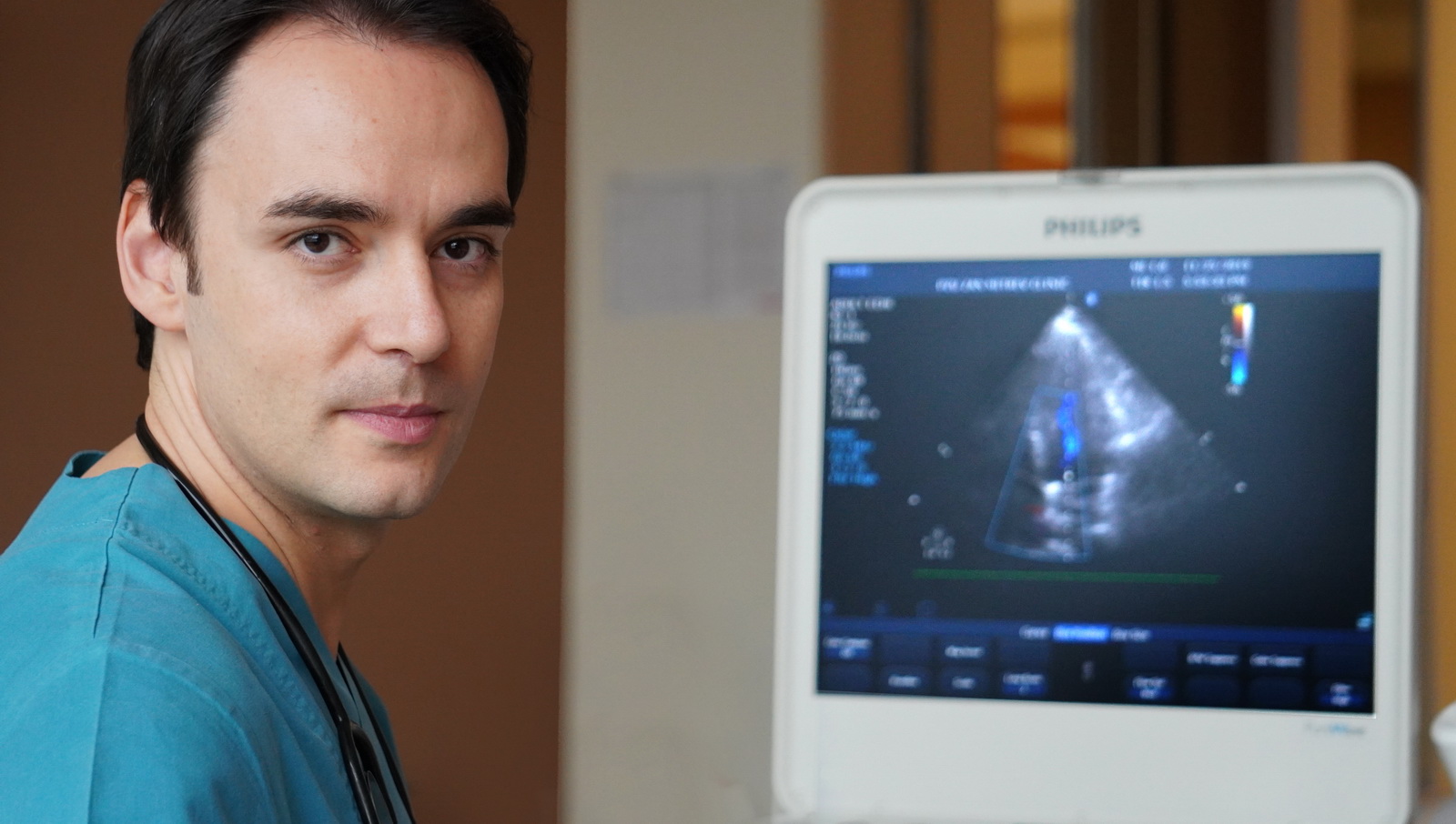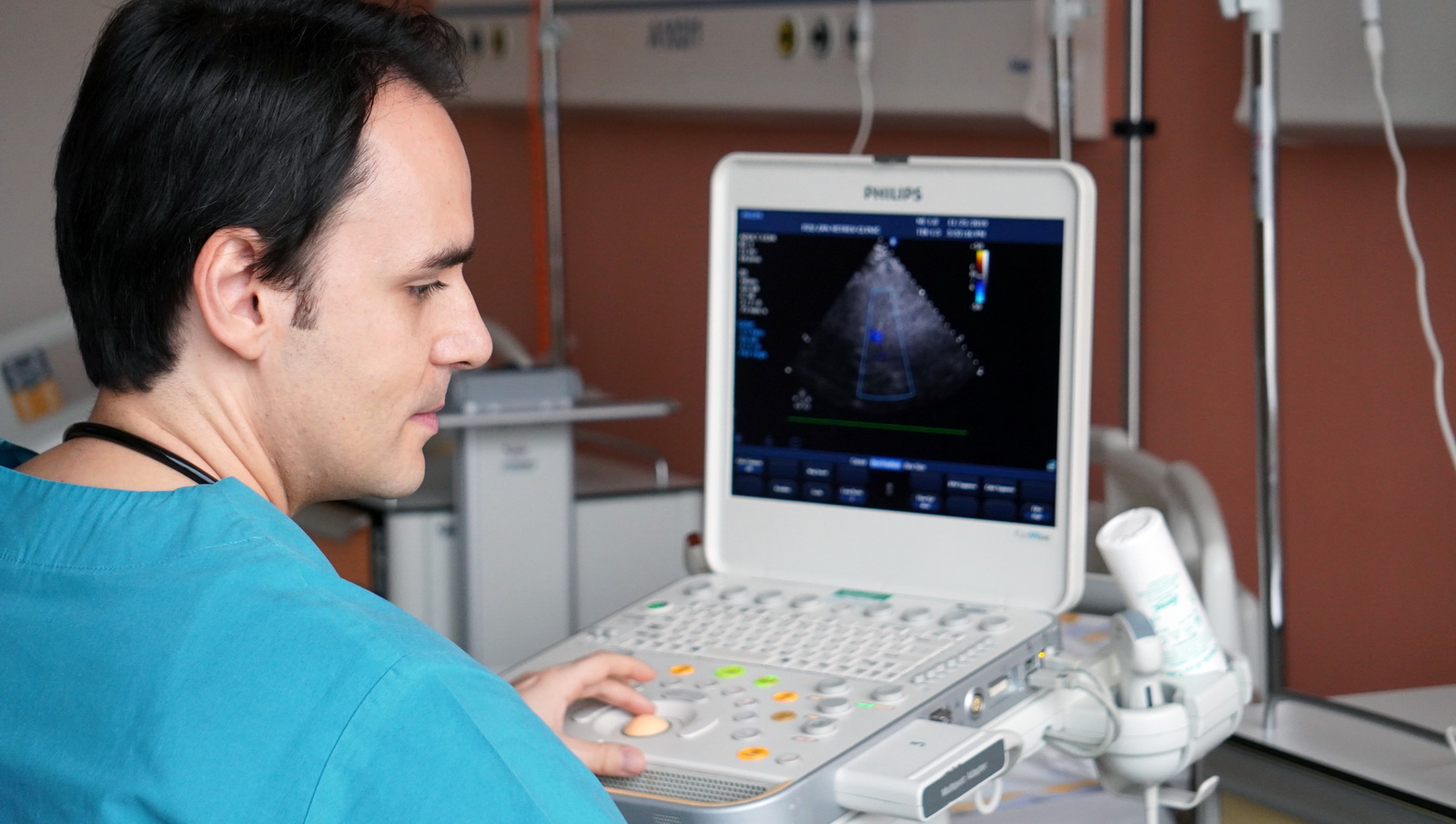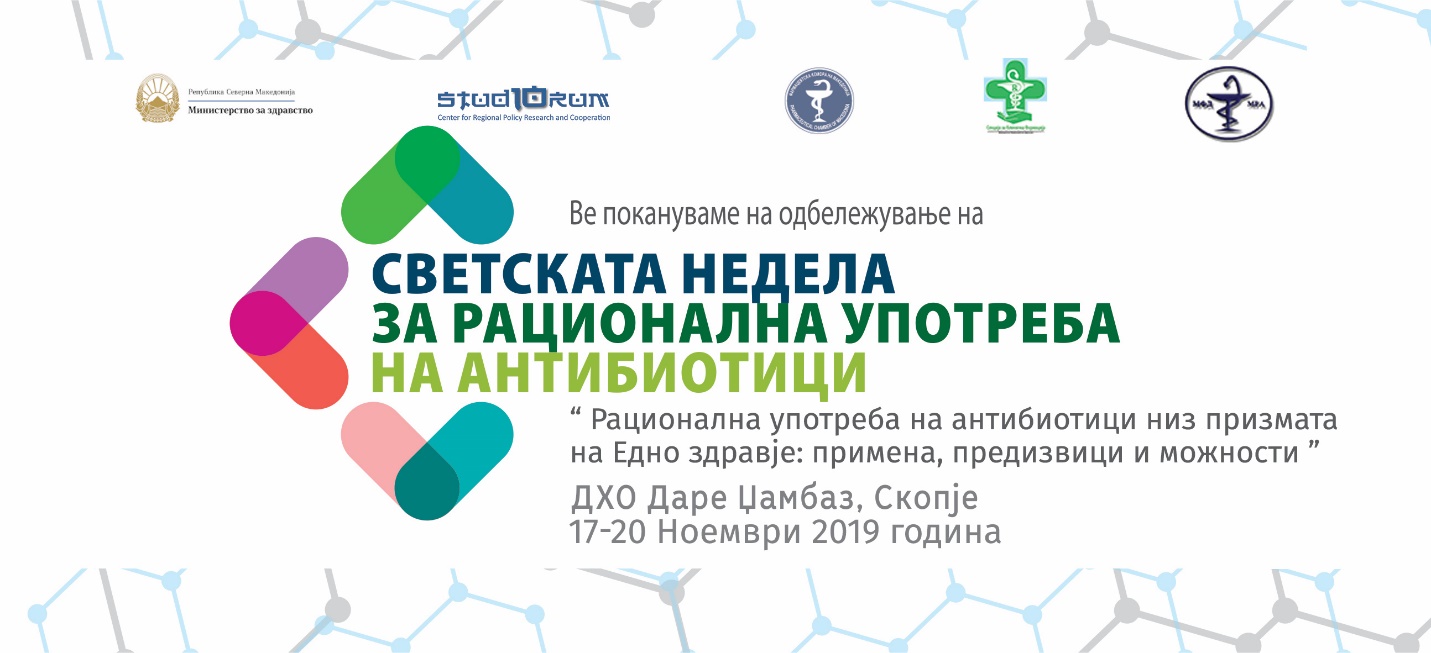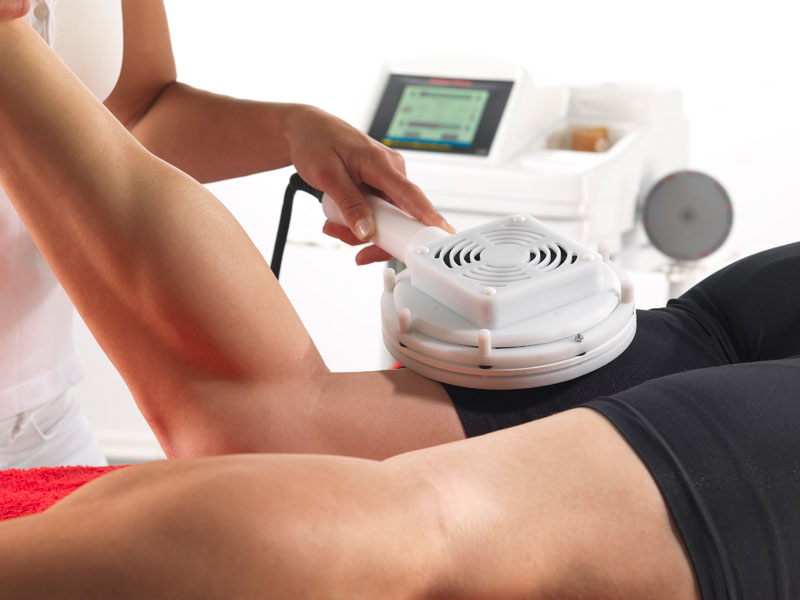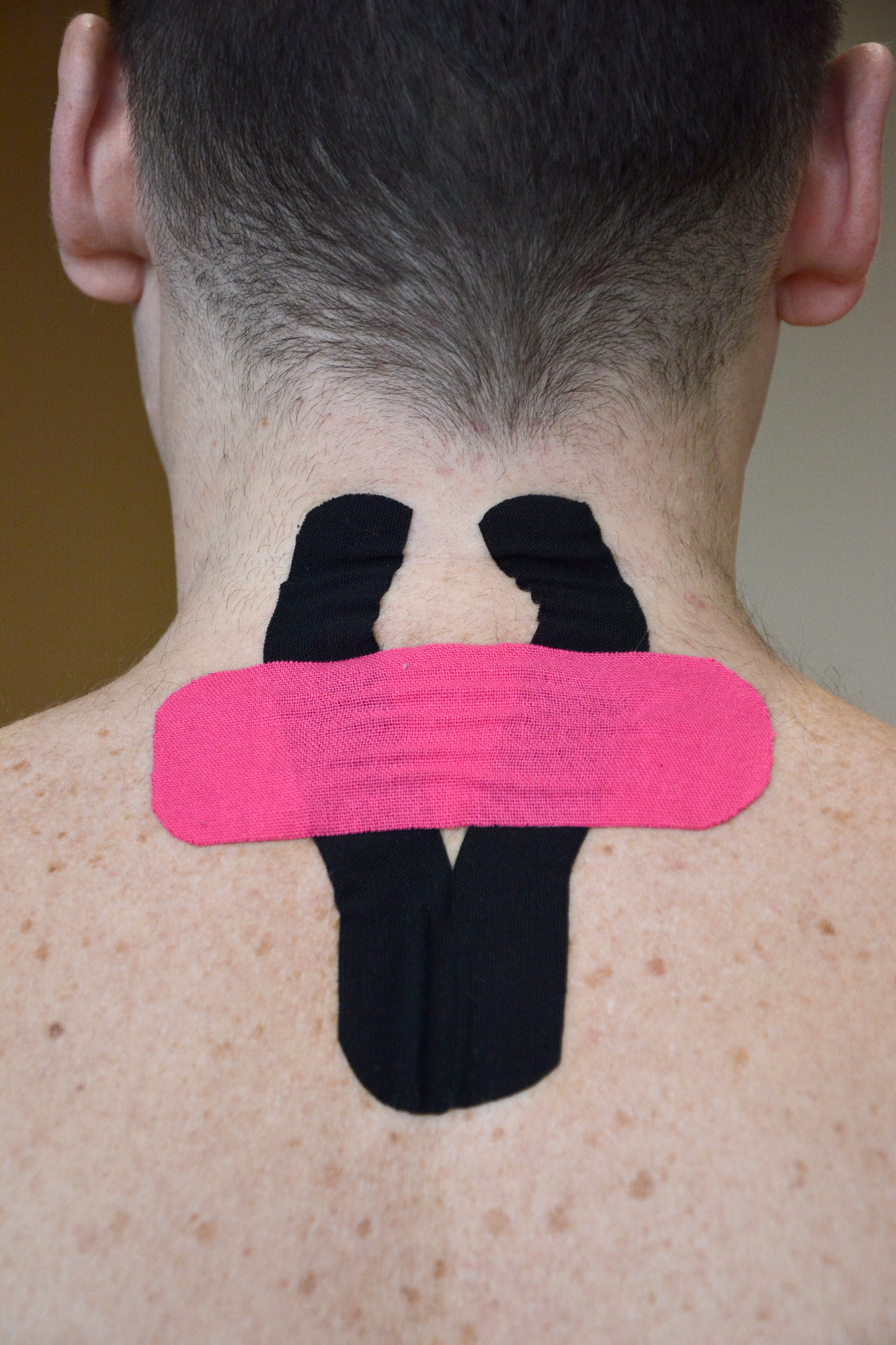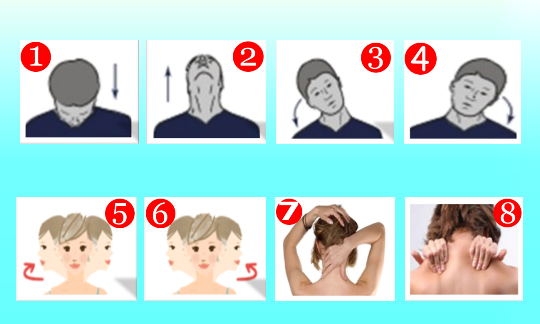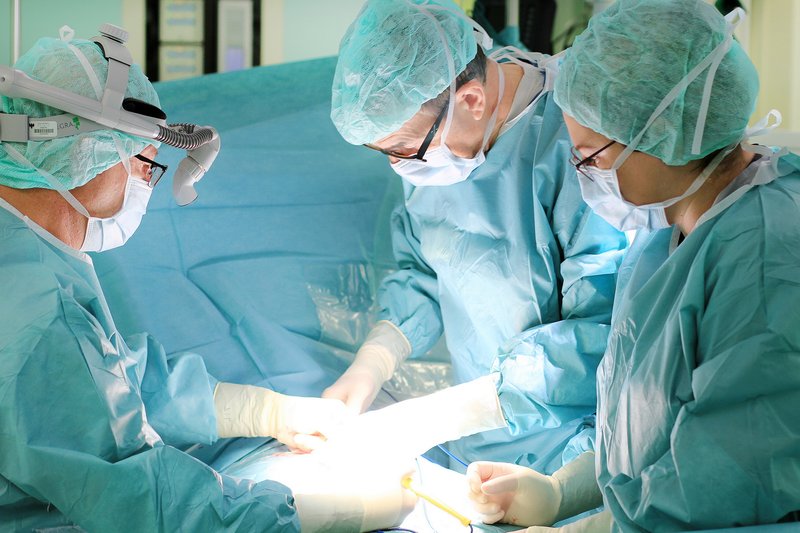The Zhan Mitrev Clinic continues to support the culture in our country. This year we give unselfish support to the original “Masks-Free Games” to be held on November 27, 28 and 29 at the Macedonian National Theatre in Skopje.
We are pleased that again this year, we have the honour to contribute to spreading of culture and the messages it sends around the world. Theatres from several countries in the region, and we are especially glad that many of them are children, will participate in this international inclusive drama festival organized by the Citizens’ Association “World of Different but Equal”.
The Zhan Mitrev Clinic will continue to unselfishly support all projects aimed at raising citizens’ awareness of accepting people with disabilities in its daily environment.
Month: November 2019
International award for the Zhan Mitrev Clinic for scientific research related to the most common adverse cardiac and cerebrovascular conditions and the drug Clopidogrel
On October 21, 2009, the Zhan Mitrev Clinic received a new publication on the topic “The AKR1D1*36 (rs1872930) Allelic Variant Is Independently Associated With Clopidogrel Treatment Outcome.”
This original work was published in the prestigious Dove Press Journal: Pharmacogenomics and Personalized Medicine. This study was accepted and presented by the team of the Zhan Mitrev Clinic at the International Congress organized by the ESC European Society of Cardiology this year in Paris. The team that prepared this paper was composed of: Petar Ugurov MD in the role of a clinical doctor, Rodney Rosalia MD responsible for scientific research at the Zhan Mitrev Clinic, and associate professor Aleksandra Kapedanovska Nestorovska MD from the Faculty of Farmacy at the Sts. Cyril and Methodius University in Skopje.
Dr. Petar Ugurov answered a few questions related to this research conducted in our clinic and the importance of its application primarily when it comes to patients’ safety, health and rapid and safe recovery.
What was the purpose of starting this research and what is it that makes this study so specific and significant?
Dr. Ugurov: The goal of our study was to retrospectively examine genetic polymorphism in patients with pre-placed coronary stents or peripheral bypasses who were indicated to receive Clopidogrel, and to see the association of AKR1D1*36 polymorphism with the incidence of cardiac and cerebrovascular events in patients using Clopidogrel. We have developed an original work that we are proud of and, most importantly, contribute to enriching scientific thinking as well as improving patient status and reducing the risk of MACCE, or more precisely the most common adverse cardiac and cerebrovascular conditions in patients.
CLOPIDOGREL is one of the most common antiplatelet drugs that has been widely used for conditions such as acute coronary syndrome, myocardial infarction, stent placement, bypass, etc., with recent research showing that almost 30% of patients taking it have genetically predisposed resistance – which means that the drug does not work at all.
How did you come up with the idea for starting this study?
Dr. Ugurov: In March 2010, the FDA (US Food and Drug Administration) issued a warning for Clopidogrel:
– Warning for decreased efficacy in patients who are poor metabolisers of Clopidogrel. This means that poor metabolizers do not effectively convert Clopidogrel to its active form in the body.
According to research done in our clinic, patients with implanted stents for example, have 8 times greater risk of stent clogging it they are taking CLOPIDOGREL, which does not work.
It was a good reason to think and discover ways in which we can help our patients, thereby protect them from new adverse cardiac or cerebrovascular diseases.
The opening of the genetic lab at the ZMC has also opened up the possibility of investigating and understanding the problem in these patients who take certain antiplatelet therapy, but the drugs themselves do not work, and unfortunately could not be previously tested for their genetic sensitivity.
Can you tell us more about the study?
Dr. Ugurov: The beginning of genetic studies in patients on antiplatelet therapy with Clopidogrel has shown that the genetic polymorphism of the enzyme CYP2C19 is one of the possible mechanisms for the reduced antiplatelet effect of Clopidogrel.
However, the known polymorphism CYP2C19 does not provide a complete response to all observed interindividual differences and Clopidogrel-related phenotypes. As a result, we have assumed that other (genetic) risk factors are involved.
Recent studies refer to the role of the AKR1D1 gene 10-12 as a trans-genetic regulator of the Cytochrome P450 (CYP450) network. Hence the idea that polymorphism AKR1D1*36 contributes to an increased risk of frequent cardiac and cerebrovascular events during Clopidogrel therapy.
The study included 198 consecutive cases of cardiovascular patients admitted to our clinic between October and December 2010. All of these patients had prior cardiovascular, peripheral (vascular) or cerebrovascular disease requiring antiplatelet therapy. All of these patients were already on Clopidogrel therapy.
Patients were subsequently followed up until October 2015. The primary endpoint was the first clinical sign of MACCE (most common adverse cardiac and cerebrovascular events): death, myocardial infarction, stent thrombosis, stroke, hospitalization due to unstable angina, transient ischemic attack, cerebrovascular insult (CVI).
Genetic analysis of the polymorphisms AKR1D1 and CYP2C19 was performed at the Centre for Biomolecular and Pharmaceutical Analysis at the Faculty of Pharmacy within the Sts. Cyril and Methodius”, Skopje, Republic of Macedonia.
In our study, we used the Cox Proportional Hazards Model, which confirmed the following MACCE risk factors shown in Table 1:
- AKR1D1*36 allele, HR = 2.36; [95% CI, 1.34 to 4.18]
2. Previous cutaneous interventions (PCI) – (HR = 2.78; [95%CI, 1.34 to 5.78)
3. History of myocardial infarction, HR = 2.62; [95%CI, 1.48 to 4.64]
4. CYPC19*2 allele, HR = 2.33; [95%CI, 1.33 to 4.06].
Table 1. Cox Proportional Hazards Model
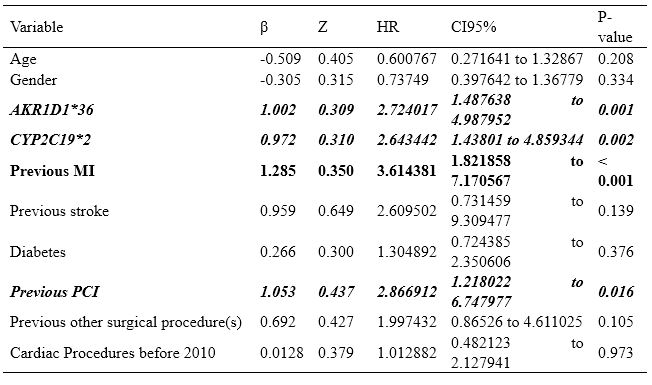
1). AKR1D1*36 polymorphism carriers are at significantly greater risk of experiencing MACCE during the following period (Hazard Ratio, 2,193 [95% CI 1.091 to 4.406], p = 0.0155)
2) CYPC19*2 polymorphism carriers are at significantly greater risk of experiencing MACCE during the following period (Hazard ratio, 2.268 [95% CI 1,147 to 6.02], p = 0.0064)
In this study, we proved and concluded that AKR1D1*36 (rs1872930) is independently associated with a higher risk of MACCE in patients with antiplatelet therapy.
What to do?
Dr. Ugurov: Because of all this, there are world-class guidelines suggesting that before initiating therapy with CLOPIDOGREL, the patient must make a pharmacogenetic analysis for the drug’s sensitivity. This test is done once in a lifetime, but it means a lot in making the right decision for effective therapy.
Therefore, we urge everyone who is on CLOPIDOGREL therapy to take this test. All that is needed is venous blood, and the results are obtained in one working day.
World Antibiotic Awareness Week
World Antibiotic Awareness Week
17.11.2019 – 20.11.2019
“The future of antibiotics depends on us all!” – this logo marks the 2019 World Antibiotic Awareness Week. The message clearly states that we have a duty to preserve antibiotics, because we cannot consider them to be inherited from our ancestors but borrowed from future generations.
Each November, the World Antibiotic Awareness Week (WAAW) aims to raise awareness of antimicrobial resistance as a global phenomenon, as well as to enhance the application of best practices among the general population, health care providers and health policy makers in order to slow down and prevent the development and spread of antimicrobial resistance.
The Republic of North Macedonia has celebrated November 18th – the European Antibiotic Awareness Day since 2008, as well as the World Antibiotic Awareness Week since its establishment in 2015.
This year, at the initiative of PZU Zhan Mitrev Clinic and the Clinical Pharmacy Section of the Macedonian Pharmaceutical Association, pharmacists were actively involved in the realization of the 5th educational seminar “Multidisciplinary Approach to the Management of Antibiotics” held on 18.11.2019 within the World Antibiotic Awareness Week.
The seminar was quite extensive and rich with lectures held by professionals from the Faculty of Pharmacy, by public health practitioners, clinicians and microbiologists, as well as pharmacists.
The seminar was introduced by the Presidents of the Pharmaceutical Chamber and the Macedonian Pharmaceutical Association and by Associate Professor Golubinka Boshevska, MD – National Coordinator of the Multisectoral Commission on Antimicrobial Resistance (AMR).
As clinical pharmacists of the Zhan Mitrev Clinic, we have given a full overview of the measures and activities we have taken to manage antibiotics in our facility. The benefits of incorporating a pharmacist into the antibiotic management team in 2017 are evident, not only with huge financial savings but also with complete controlled and safe antibiotic treatment of patients according to international standards. Decisions on antibiotic administration are based on strictly defined guidelines and quality indicators that influence the positive outcome of treatment in our patients. For each patient, the prescribed antibiotic therapy is individually checked for suitability according to age, body weight, and laboratory parameters. The concentration of antibiotics in the blood is monitored for dose adjustment according to individual characteristics in order to optimize it and reduce adverse effects. We can proudly say that the interventions implemented in the strict control and management of antibiotics follow the world standardized hospitals.
The purpose of our presentation at this seminar was to practically present the positive trends in controlled antibiotic use, share the positive experiences of other clinical pharmacists, our colleagues, and transfer this positive practice in their health care facilities with our knowledge and resources.
Functional magnetic stimulation for faster strengthening of atrophic musculature
The functional magnetic stimulation is a non-invasive, painless method that allows a contactless stimulation of the superficial and the deep muscle structures under the influence of a high magnetic field with a strength of 1.5 to 2T. The FMS enriches the arsenal of the physiotherapists in their fight against certain ailments suffered by the patients. This new method uses the rapid changing of magnetic field (magnetic induction) in order to cause a quality muscle contraction. The advantage is in the intensity of the magnetic field that can penetrate up to 5 cm into the soft tissues and to cause contractions of the deep muscle structures that usually cannot be achieved with the standard electro stimulation.
The method is painless and non-invasive, it can be performed without a direct skin contact, and the treatments are adapted individually to each patient depending on their condition. The duration of the treatment is 10-20 minutes in a series of 10 treatments, every second day.
No special preliminary preparations are required for the treatment, only the appropriate positioning. The use of the FMS applicator requires no prior locating of the motor points on the muscles or on the nerve, in order to perform the treatment. The applicants used for this method are so designed in order to cause an adequate muscle contraction. With this method we can achieve much simpler and faster strengthening of the atrophic musculature, a sensory input, as well as a nerve-muscle education of the movements.
Indications for treatment: disorders of the musculoskeletal system; degenerative arthritis; rheumatoid arthritis; muscle pains; spinal disorders (acute / chronic lumbalgia, sciatica, spina bifida, spondylitis); the nerve disorders (peripheral nerve damage); muscle relaxation; frozen shoulder; rehabilitation of nerves and muscles after fractures; sports injuries; pain control, muscular atrophy, ankylosis and urogenital diseases.
Contraindications: permanent pacemaker; malignant arrhythmias; placement of the applicator through the carotid sinus; pregnancy; metal within the treated area (joints` implants, osteosynthetic materials, etc.)
For more information call 02 / 3091484
Visit a urologist before it’s too late
It is rare for men to visit a urologist for a check-up without having any symptoms or visible problems. Statistics say that men mostly visit the urologist when they already have very pronounced symptoms indicating an advanced stage of a disease, when treatment is much more difficult.
Many men spend their entire lives without visiting a urologist.
However, by avoiding the urologist, men can seriously neglect and endanger their health.
There is no specific age when regular examinations should begin. In younger men, the most common urologic disorders are inflammatory diseases of the urethra and penis glans, as well as inflammation of the prostate or testicles.
Kidney or urinary tract stones are also common. Recently, there has been an increase in malignant diseases, and of special concern is the testicular tumor that occurs between the age of 15 and 40.
Enlarged prostate and prostate cancer usually occur after the age of 45. We can conclude that men should visit a urologist in their youth, but especially after the age of 50.
The urologic examination is a very simple and painless examination. Through conversation, first the urologist determines whether there is a urologic problem, and then the external genitalia and the prostate are examined by palpation.
Then follows an echotomographic examination used for revealing many urologic diseases. It is important to remember that with such check-ups, a disease in an early stage could be detected, thereby ensuring that treatment is more efficient and simplified.
Neck and shoulder pain
Modern lifestyle, frequent use of smart devices, reduced physical activity as well as prolonged exposure to stress and inappropriate body positions can all contribute to neck and shoulder pain. Severe pain and stiffness in the muscles are the most common symptoms that occur. Late reaction to the first symptoms after a period of time leads to an inevitable situation in which we must stop working for a few days in order to seek appropriate treatment to reduce pain and improve our condition.
Physical workers or workers who spend long periods of time in front of a computer in an improper position are the ones who suffer most from myalgia of the neck muscles. To prevent this, they need to occasionally stop their activities on a daily basis for 10-15 minutes and do a few exercises in order to improve peripheral circulation in the muscles and work the major muscle groups.
When this condition occurs, it is necessary to apply physiotherapy immediately, even during rest, as physiotherapy covers a wide range of pain treatment techniques and methods and can significantly improve the condition. Pain relief treatments can last for several days, depending on the condition.
Pain relief treatment of this type may include: cryotherapy-cryomassage, manual massage therapy, kinesiotaping, ischemic compression trigger point release, electrotherapy, and later also exercises to strengthen the muscles which will have ecertainly weakened during the periods of strong pain and immobility.
If you have frequent neck pain and feel tension in these muscles, consult our physiotherapists and schedule a treatment at the following telephone number 02/3091484 or 070257-962.
A new type of testicular prosthesis implanted in a young patient
One of the newest types of testicular prosthesis was implanted in a young patient at the Zan Mitrev Clinic. Dr. Goran Jovic, who is an urological surgeon in our clinic, says that such prosthesis are a safe and adequate replacement for the loss of one or both testicles.
– It’s an implantation of a testicular prosthesis. The procedure was performed on a young patient who had lost one testicle in a car accident. This testicular prosthesis is not only an aesthetic solution but also helps the patient return to normal life without any difficulties. He will not have the feeling of a removed organ and will have a normal sex life with no disability. That is one of the goals why such a prosthesis is implanted – explains Dr. Covic.
This implanted prothesis is the first of its kind, a soft type of prothesis that provide fine imitation of a natural testis.
– The postoperative period is short. The patient remains in the hospital for 24 hours and is back to normal functioning after ten days – adds Dr. Covic.
A testicular prosthesis can be implanted in case of loss of one or both of the testicles for any reason.




